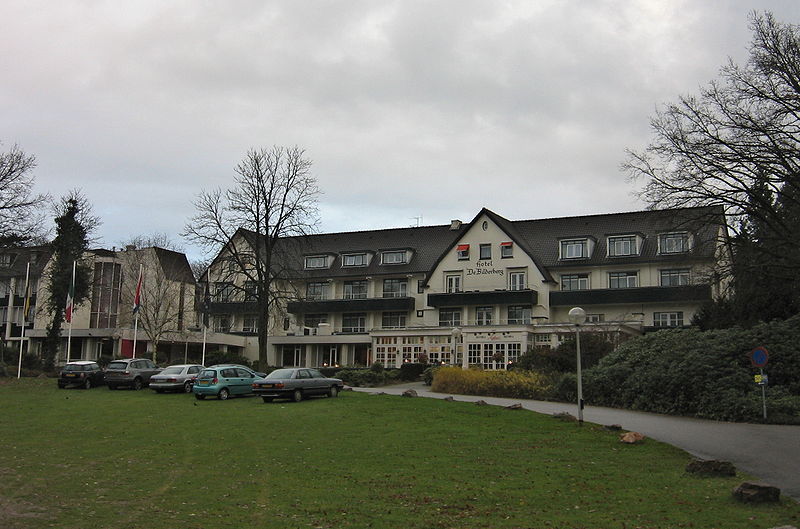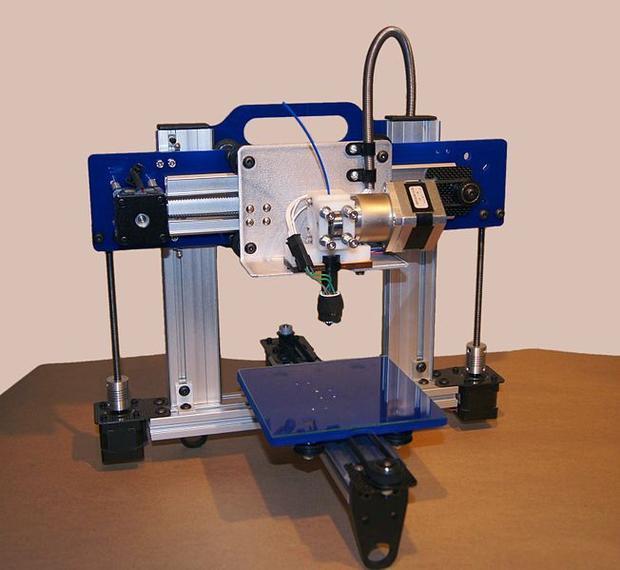
The Hotel de Bilderberg is a hotel in Oosterbeek in the Netherlands where the Bilderberg Group first met in 1954.

The Hotel de Bilderberg is a hotel in Oosterbeek in the Netherlands where the Bilderberg Group first met in 1954.
It is not true necessarily that small is beautiful; so-called natural monopolies like gas and electricity can operate only on a large scale. Likewise everything from car manufacturers to supermarkets are able to produce and distribute goods incredibly cheaply due to economies of scale. Tinned food is a classic, everyday example of this. Specialisation, including by entire nations, facilitates the production of food or goods profitably which can be exported, boosting trade with the world, and increasing their own wealth. What though if suddenly none of this mattered?
First, let us look at what is actually happening. For decades, conspiratorial élites like the Trilateral Commission – founded 1973; the Bilderberg Group – founded in 1954; and the aforementioned CFR, have been peddling the same message, namely that this is one world, we are all in this together, and in order to solve the enormous problems the world faces we have to cooperate as one, ie we must all surrender out sovereignty to a world supra-government.
A world government means, in their eyes, that nation states are obsolete, which is why there has been such a concerted attack on nationalism, in the West at any rate. This ideal of a benevolent, all-powerful world government is as old as the hills. The reality though is that nothing and no one all-powerful is ever benevolent. Under a world government, people will have what rights our masters give us, not those endowed upon us by our Creator – as the saying goes.
So far, the attempt to create this world government, through the United Nations and before that through the League of Nations, has been a resounding failure, but the conspirators are pressing on undeterred, even though the secret is now out in the open, as the heavy alternative and even mainstream media presence at recent Bilderberg meetings attests. One of the more subtle ways the power élites have attempted to abolish nation states is with international treaties. One prerequisite to the imposition of tyranny is the disarming of the population. Recent gun outrages in the United States – such as Sandy Hook – have led to calls for the curtailment of the private ownership of guns. While most people would agree that it is not a good idea for ordinary folk to walk around the streets carrying high powered automatic firearms, there are those who want to go much further, but there is a little thing called the Constitution of the United States standing in their way. What though if the US were to sign an international treaty that called for the abolition of all guns held in private hands? That would over-ride the Constitution – treaties do. Ditto with censorship, especially of the Internet. Now that you know what is the problem, the big question is, what can we do about it?
Most people don’t give a stuff about international treaties or anything else as long as they’ve got money in their pockets, and this is where new technology can break the stranglehold of the conspirators, if we can harness it.
What does the world need, increasingly? Food, energy, consumer goods. As long as we have those, we don’t need that much in the way of infrastructure. If that claim sounds bizarre, consider this. With the advent of the Internet, most office workers could telecommute. A lot of people work from home already, but a great deal of office work doesn’t need an office, or even to be done at all.
The City of London and other financial centres shuffle money around all day long day in, day out, yet the vast majority of such transactions are not investments, they are gambling pure and simple. How else can a parrot outperform professional investors by picking out shares with its beak?
If the governments of the world were to shut down all managed funds – including pension funds – people could be left free to invest their own money on their own account, as a few choose to do. This would free up enormous superfluous office space and reduce wasteful expenditure on things such as advertising and overpaid economists, be they (ostensibly) free market or not so.
Distance learning, including by YouTube could further reduce the need for travel. Instead of allowing the banks to create money as an interest-bearing debt, money could be issued to and distributed through the Internet, not as Bitcoin but as regular dollars and other currencies paid to the creators of wealth.
These are all things we could do today, theoretically, but look into the future and imagine what could be done by harnessing new technologies, and ones that are already being developed.
The world may run on electricity, but most of that electricity comes from oil in one form or another. Although oil can be extracted from the Earth virtually for free, it is expensive to transport. It is also fair to say that most of the wars of the previous century and of this one are related in some way to oil and other forms of energy. But what if we didn’t need oil to produce energy? The demand for it wouldn’t dry up, but it would surely shrink to a tiny fraction of what it is now.
Solar energy, wave power and wind power have been with us for a long time. Some quite massive projects of this nature are already underway, but of late another environmentally friendly way of producing electricity has been developed – harnessing it from plants. This is likely to be useful only on a small scale, but imagine combining this with aquaponics to provide cheap, fresh food for a village, and free or near free electricity.

A commercial aquaponics system.
There are though two new forms of technology that have enormous potential for reducing the cost of manufacturing to zero, and one of them is here already. They are 3-D printing and self-replicating machines. 3-D printing hit the headlines big time recently when Cody Wilson of Texas produced a design for a bargain basement printed gun then placed it in the public domain, but the full potential of 3-D printing is absolutely enormous extending far beyond the novelty firearms that are already causing nightmares for law enforcement.
Now combine this with self-replicating machines. Take a gander at the RepRap project.

A 3-D printer, this futuristic device is here already and will change our lives for the better, if we allow it.
Now imagine the following: small, stable communities dotted around the world with a 3-D printer and a general purpose self-replicating machine in every home. Every village or perhaps every other street having a small aquaponics farm to provide small scale fresh vegetables, salads, fruit and fish for the community. This farm also generates electricity to augment the solar panels on every roof. Other advanced technologies are used to break down sewage and other waste products into carbon, hydrogen, nitrogen and oxygen, which are then discharged to the atmosphere, or to provide fertiliser and animal feed for the local eco-system. Metals in the water and waste are concentrated using bacteria, and can then be fed into 3-D printers. Most consumer goods and foodstuffs are dirt cheap, so much so even the most dedicated thief or anti-social would find no mileage in stealing what he could obtain legally for minimal effort.
Purchasing power is distributed increasingly in the form of a dividend, again through the Internet, in line with the Social Credit principles of Major Douglas as robots perform more and more of our daily chores and create more and more wealth.
With energy, food and consumer goods being increasingly taken out of the financial system, it sounds like Paradise, and it can be, but finance itself will have to change. Consider this, entire industries will vanish with the implementation of this new technology, and all the jobs associated with them. Look at some of the jobs that have disappeared over the past century and more: blacksmith and chimney sweep (as good as), copy typist, lamplighter, typesetter. This latter is particularly instructive; with the universality of computing, the once highly paid trade of typesetting has now disappeared completely if not overnight then in literally a few years, because you can do it on your desktop, anyone can. There is more though.
Huge construction projects such as those currently ongoing in China generate massive employment and livelihoods for ordinary working people. Take away these projects, and their livelihoods disappear along with the jobs of yesteryear, but they don’t have to. The jobs and projects, yes, but not the purchasing power of the people who used to perform them.
If you haven’t already read this article, go back and do so, then ask yourself why newspapers are going out of business, and why the post office can no longer turn a profit.
Distributing wealth for next to nothing – music, newspapers, etc – on-line benefits us all, but not the creators of this wealth. In order to take advantage of this new technology to the fullest extent, we will need to totally transform the financial system, which means taking it out of the hands of the banks.
Something else new technologies can make redundant is the mass movements of peoples around the globe. This has been one of the major causes of social friction and unrest as people in country A) find themselves under siege from those in country B). Of course, a heart surgeon from India or the Middle East is not “taking the job” of an unskilled worker in the North of England, and contract workers from the Far East do not displace the natives of Saudi Arabia, but the perception is often very different.
With advanced technologies, the need for such so-called flexible workforces will disappear; travel, once the preserve of the rich, will be primarily for the tourist, which with longer holidays, will be most of us at some point in time. Travel too could be taken increasingly out of the financial system, certainly within cities. Fare-free local transport running on cheap electricity would eliminate the need for most private cars, and greatly increase the quality of the air. Electric cars and the new hydrogen car are already with us.

A 2005 photograph of the H4 hydrogen car alongside a zero emission London bus.
This is the alternative to the world supra-government the global manipulators have in store for us, but it won’t simply happen of its own accord, we must make it happen.
The people behind RepRap are developing these exciting new technologies as open source, as are those behind Mozilla, so why not something similar to take on Monsanto, and ultimately both the banksters and their political puppets?
The New World Order is not inevitable, people are already using new technology through social networks in the fight against tyranny; if we develop and exploit this new technology to the full, we can see off those who would enslave us all.
[The above op-ed was first published June 15, 2013.]
Return To Site Index